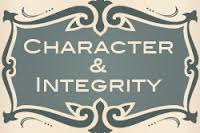 “Always do what is right and you won’t be sorry.”
“Always do what is right and you won’t be sorry.”
Wilburn K. Ross
Recipient of the
Congressional Medal of Honor
It is interesting to note that on a typical construction site, cement crews often do their work very early in the morning, before the other workers arrive. They follow a plan, calculate what is needed, and begin to pour the material that will stabilize the entire effort. However, the final determination of the cement crew’s efforts will not be seen right away, but when the building settles. Only when the full weight of the structure is placed on the foundation will the true integrity of what they’ve built be tested. Only then, will their true workmanship be revealed.
So it is with our character.
Character can be defined simply as who we are when no one is looking. It is the set of qualities that define us as a person. In essence, our character is what guides our responses to any situation or circumstance in our life.
At a fundamental level, being a person of character is demonstrating by our words and our ways that we can be trusted. It’s affirming in all we do that we will keep promises and follow through on commitments. However, every day we hear about or experience firsthand people who fail to keep their word or fall far short of following through on what they told us they would do. Sadly, in today’s world it seems as the willingness to “walk our talk” has largely become optional.
The important truth that the strength of our character is best revealed in how well we stand up under the weight of the daily choices we make in life reminds me of a story in author Jerry White’s book, Honesty, Morality & Conscience.
The setting is a college classroom in one of America’s premier universities. As students prepared for their professor to pass out their exams, the chatter in the room dwindled to a few nervous comments and laughs. Several students hastily reviewed their notes, while others sat nervously tapping their pencils on the desks. The normal pre-exam tension filled the air, accompanied by sweaty palms and jittery stomachs.
The professor gave a few brief words of explanation and walked out of the room, leaving a pair of student proctors to monitor the exam and answer any questions. There was a sigh of relief as soon as he left and almost immediately, crib sheets emerged, books opened, and dozens of students began blatantly cheating.
One student, however, saw the obvious cheating and became inwardly agitated. A former cadet at the United States Air force Academy, he was now working on a special assignment to complete an advanced degree. He had been trained for four years under an honor code at the academy that hinged on honesty, integrity and always conducting oneself as a person of uncompromising character.
Finally, he could take it no longer and stood up and announced to the class, “What you’re doing is wrong! It’s cheating! I can’t stand for it and I plan to report it to the instructor.”
He sat down as abruptly as he had stood up. The class was speechless. Then a new wave of nervousness swept across the room.
After the exam several students congratulated the student for his courage. Cheating bothered them too, they said, but it was so common they had felt unable to do anything about it.
The student reported the cheating, and the exams were ultimately discarded and a new test was administered. What was accomplished by his action? Although it may not have stopped all the cheating, a clear standard of what was right was established in the classroom. Additionally, others were empowered and inspired to act on their convictions in future situations. Everyone, the courageous student and scores of others, developed a strengthened sense of integrity and honesty that day. Proof positive that what you choose to do, or not to do, matters.
Several centuries ago, Aristotle pointed out to his pupils the importance of developing moral virtues through practice. Doing right actions allows those actions to become part of our identity – integrated into our character. Today, we use the word integrity to describe the behavior of those persons who consistently choose to do the right thing, even when doing so is tremendously difficult. That is, we view persons of character as individuals whose internal convictions and external actions are so well aligned, so congruent, that they do not stray from what they believe is important even when it may be expedient or personally advantageous to do so.
Would you consider yourself someone who values character over everything else? Do you sometimes find yourself looking the other way when something occurs you know isn’t appropriate? What is the condition of your leadership foundation?
Author R. C. Samsel once remarked, “Character is the foundation stone upon which one must build to win respect. Just as no worthy building can be erected on a weak foundation, so no lasting reputation worthy of respect can be built on a weak character. Without character, all efforts to attain dignity is superficial, and results are sure to be disappointing.” So remember, your character is much more than just what you try to display for others to see—it is who you are even when no one is watching.
